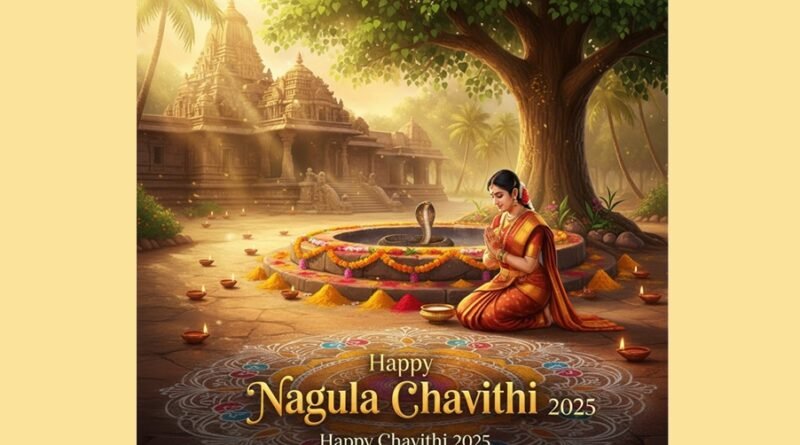Nagula Chavithi 2025: Date, Significance, Rituals, and Mantras
Nagula Chavithi on Saturday, October 25, 2025
Puja Muhurat: 10:58 AM to 01:12 PM
Duration: 2 Hours 15 Minutes
Chavithi Tithi Begins: 01:19 AM on October 25, 2025
Chavithi Tithi Ends: 03:48 AM on October 26, 2025
Introduction
Nagula Chavithi, a vibrant and spiritually significant festival, will be celebrated on Saturday, October 25, 2025. Observed on the fourth day (Chavithi Tithi) after Deepavali Amavasya, during the auspicious Karthika Masam, this festival is deeply rooted in the worship of Nag Devatas or Serpent Gods. It is particularly celebrated with fervor in Andhra Pradesh, Telangana, and parts of Karnataka, where age-old customs continue to echo through generations.
Primarily observed by married women, Nagula Chavithi is a day to pray for the wellbeing and long life of children, and to seek protection from snake-related fears and doshas (afflictions). The rituals are deeply spiritual and symbolic, intertwining nature worship, mythology, and devotion.
Read This: Nagula Chavithi 2025: Date, Significance, Rituals, and Mantras
Spiritual Significance
Snakes or serpents hold a sacred place in Hindu mythology and spirituality. From being an adornment of Lord Shiva (Vasuki) to forming the cosmic bed of Lord Vishnu (Shesha), serpents are seen as guardians of the underworld, symbols of fertility, wisdom, and divine power.
According to traditional beliefs, any worship offered to snakes on this day reaches the Naga Devatas themselves. It is also believed that appeasing the serpents on this sacred day can remove the ill effects of Sarpa Dosha, Naga Dosha, and Kalsarpa Yoga, and bring about prosperity, protection, and peace in the household.
Rituals and Observance
Nagula Chavithi is marked by a series of detailed rituals, carried out with devotion and discipline:
1. Fasting (Vratham)
- Married women observe a strict fast from morning till the puja is completed.
- Some may choose a nirjala vrata (no water fast) while others may consume fruits or light offerings after the puja.
2. Bathing and Preparation
- Devotees wake up early before sunrise, take a bath, and clean their homes and courtyards.
- A small snake pit or anthill (Putta), usually made of clay or near natural anthills, is prepared as the symbolic abode of Naga Devatas.
- Special rangoli (muggulu) designs are drawn using rice flour near the pit or altar to invite divine energies.
3. Puja Offerings
- Milk, turmeric powder, kumkum, and sandalwood paste are offered at snake burrows or idol representations.
- Fruits, jaggery, black sesame seeds, and traditional Naivedyam (food offerings) such as Chalimidi, Atukulu (flattened rice), and Bellam (jaggery) are also presented.
- In some rural areas, live snakes are worshipped, especially cobras, with utmost reverence and care.
4. Recitation of Naga Devata Mantras
- Devotees recite sacred mantras invoking the blessings of the serpent gods.
- Special stories and vratha katha (spiritual stories) associated with Nagula Chavithi are read or narrated, emphasizing the importance of the day.
5. Charity and Feeding
- Feeding ants, birds, and cows is considered highly meritorious.
- Donations and offerings to Brahmins, priests, or needy children are also part of the day’s acts of virtue.
Naga Devatas Worshipped
During the Nagula Chavithi Puja, devotees pay homage to the twelve principal serpent gods, each believed to possess unique powers and significance:
- Ananta – The endless one, representing eternity.
- Vasuki – The king of serpents, worn by Lord Shiva.
- Shesha (Adishesha) – The cosmic serpent upon whom Lord Vishnu rests.
- Padma – Symbol of purity and lotus-like grace.
- Kambala – Guardian of the subterranean world.
- Karkotaka – Known for his role in Mahabharata.
- Ashvatara – Serpent associated with divine knowledge.
- Dhritarashtra – One of the protectors of directions.
- Shankhapala – Often depicted as a guardian of wealth and prosperity.
- Kaliya – The serpent subdued by Lord Krishna in Yamuna river.
- Takshaka – King of snakes and central to many legends.
- Pingala – Symbolic of time and destruction.
Powerful Mantras for Nagula Chavithi
Universal Naga Shanti Mantra
सर्वे नागाः प्रीयन्तां मे ये केचित् पृथ्वीतले।
ये च हेलिमरीचिस्था येऽन्तरे दिवि संस्थिताः॥
ये नदीषु महानागा ये सरस्वतिगामिनः।
ये च वापीतडगेषु तेषु सर्वेषु वै नमः॥
Translation:
May the snakes who dwell on Earth, in the sky, in the divine heavens, in the sun-rays, in rivers, and in sacred waters bless us. We offer our salutations to all such divine serpents.
Navanaga Stotra
अनन्तं वासुकिं शेषं पद्मनाभं च कम्बलम्।
शङ्खपालं धृतराष्ट्रं तक्षकं कालियं तथा॥
एतानि नव नामानि नागानां च महात्मनाम्।
सायङ्काले पठेन्नित्यं प्रातःकाले विशेषतः।
तस्य विषभयं नास्ति सर्वत्र विजयी भवेत्॥
Translation:
The nine great serpent deities – Ananta, Vasuki, Shesha, Padmanabha, Kambala, Shankhapala, Dhritarashtra, Takshaka, and Kaliya – if their names are chanted daily in the morning and evening, the devotee shall be protected from all poisonous dangers and attain victory in all endeavors.
Cultural Significance
In many homes, Nagula Chavithi is not just a religious festival but a cultural event that brings families and communities together. Mothers pass on traditions to daughters, children are taught stories of divine serpents, and neighborhoods echo with chants and the aroma of festive offerings.
For agrarian communities, the day also marks respect to nature and soil, as snakes are natural protectors of crops by controlling pests. Worshipping them signifies gratitude towards ecological balance and biodiversity.
Conclusion
Nagula Chavithi is more than just a ritual; it is a profound expression of faith, tradition, and ecological wisdom. As devotees across South India prepare to observe Nagula Chavithi on October 25, 2025, the day serves as a reminder of the divine harmony between humans and nature, and the sacred ties that bind generations through spiritual customs.
By observing this festival with sincerity and devotion, one invokes the blessings of the Naga Devatas, seeking protection, prosperity, and peace not only for themselves but for the world at large.
Wishing you a blessed and spiritually fulfilling Nagula Chavithi 2025!
॥ नाग देवतायै नमः ॥

